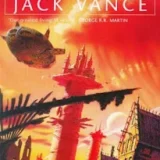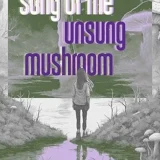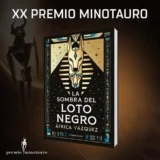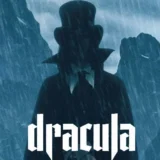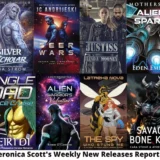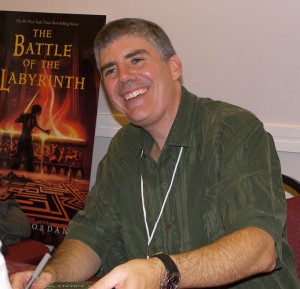 When I heard Rick Riordan would be speaking just outside Chicago, I bought a couple of tickets for my daughter and a friend of hers to attend. I also reached out to Riordan’s publicist on the off chance that he might be able to squeeze an interview into his schedule. I was granted a few minutes with the author before his talk. When we arrived at the theatre where it would be taking place, the line stretched down the block, around the corner, and to the end of the next block. I dropped off my daughter, who was joined by a friend, and as they were given copies of Riordan’s latest novel, The Blood of Olympus, I was escorted into the depths of the theatre to interview Riordan. When I walked through the theatre after the interview, I stared at the tops on hundreds of heads and his expectant audience was bent over their newly acquired books, reading.
When I heard Rick Riordan would be speaking just outside Chicago, I bought a couple of tickets for my daughter and a friend of hers to attend. I also reached out to Riordan’s publicist on the off chance that he might be able to squeeze an interview into his schedule. I was granted a few minutes with the author before his talk. When we arrived at the theatre where it would be taking place, the line stretched down the block, around the corner, and to the end of the next block. I dropped off my daughter, who was joined by a friend, and as they were given copies of Riordan’s latest novel, The Blood of Olympus, I was escorted into the depths of the theatre to interview Riordan. When I walked through the theatre after the interview, I stared at the tops on hundreds of heads and his expectant audience was bent over their newly acquired books, reading.
 Steven H Silver for Amazing Stories: Before you were an author, you taught. How does your former career influence your writing?
Steven H Silver for Amazing Stories: Before you were an author, you taught. How does your former career influence your writing?
Rick Riordan: I would be hard-pressed to think of a way being a teacher didn’t impact the way I present material. It was perfect on the job training for writing for children, although I didn’t realize it at the time. It gave me a very good sense of what kids find interesting, what they find boring, what they laugh at, what engaging them. I learned everything I know about my audience from my years of teaching. I taught mostly middle school, sixth, seventh, and eighth grades, so that is kind of the audience I had in mind when I began writing Percy Jackson, although I’ve found out the reading age is actually much broader than that, it is basically from eight up. I taught English, no surprise, and history, no surprise. The mythologies are all right there.
ASM: How aware of the writings of Joseph Campbell are you when you’re working on a book?
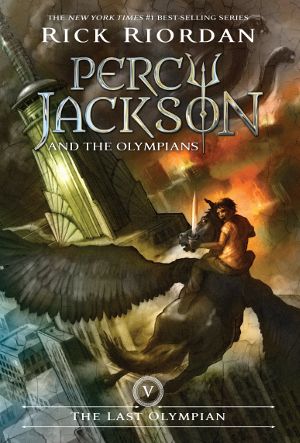 RR: I don’t think about it, that’s a Campbellian thing to say, I’m not conscious of Campbell’s writings and theories when I’m writing. Of course I’m aware of Campbell and sort of the archetypes of mythology. It’s not something I really think of day to day. It’s fascinating stuff. I don’t try to write to that, if that makes any sense. Certainly I’m away of the Hero’s Journey, and as a teacher I’ve talked about that a lot with my kids.
RR: I don’t think about it, that’s a Campbellian thing to say, I’m not conscious of Campbell’s writings and theories when I’m writing. Of course I’m aware of Campbell and sort of the archetypes of mythology. It’s not something I really think of day to day. It’s fascinating stuff. I don’t try to write to that, if that makes any sense. Certainly I’m away of the Hero’s Journey, and as a teacher I’ve talked about that a lot with my kids.
ASM: Have you considered writing a non-mythologically based novel for young adults, or a fantasy for adults?
RR: It’s one of those things that sure, I’ve thought of [writing in a non-mythological vein for YA], what would I do if…And I’m a fairly broad reader. I read a lot of different genres and types of books. But I don’t know that I would branch into those, simply because I think I’ve found my strength and I’m working to my strength right now, so we’ll see. I don’t have any adult books planned, it would have to be something that really just  jumped out at me that I would really have to write. Fantasy and science fiction, romance, well, a little romance is always good no matter what you’re writing, you know I started with fantasy with The Lord of the Rings and got into science fiction from there, Stranger in a Strange Land was one of the books that really influenced me when I was in high school. Citizen of the Galaxy, great stuff. But I don’t know if that is something that I would want to write, although I still read it. I’m behind, quite a lot in what is out there. I’m just starting to read some of the great new stuff, like John Scalzi’s books are fantastic and Patrick Rothfuss’ fantasy is just amazing stuff. There’s some really wonderful stuff being written.
jumped out at me that I would really have to write. Fantasy and science fiction, romance, well, a little romance is always good no matter what you’re writing, you know I started with fantasy with The Lord of the Rings and got into science fiction from there, Stranger in a Strange Land was one of the books that really influenced me when I was in high school. Citizen of the Galaxy, great stuff. But I don’t know if that is something that I would want to write, although I still read it. I’m behind, quite a lot in what is out there. I’m just starting to read some of the great new stuff, like John Scalzi’s books are fantastic and Patrick Rothfuss’ fantasy is just amazing stuff. There’s some really wonderful stuff being written.
ASM: Were there difficulties merging Greek and Egyptian mythology for you Percy Jackson-Kane Chronicle crossovers?
RR: It wasn’t too difficult [to merge Greek and Egyptian mythology] because historically the Greeks and the Egyptians were merging their 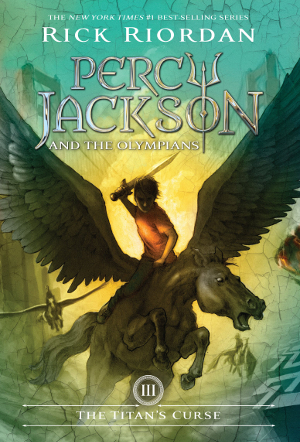 mythologies for centuries, that’s the Ptolomaic dynasty, that’s what it was all about. So that really was my stepping point: Ptolomy and when the Greeks took over Egypt, how they, in fact, tried to merge the mythologies, so that was kind of my stepping off point.
mythologies for centuries, that’s the Ptolomaic dynasty, that’s what it was all about. So that really was my stepping point: Ptolomy and when the Greeks took over Egypt, how they, in fact, tried to merge the mythologies, so that was kind of my stepping off point.
ASM: After Greek, Egyptian, and Norse mythology, where next?
RR: I have thought about the non-Western mythologies. When I was a teacher I would cover all kinds of mythologies. There are so many African mythologies I would love to cover. The Aztec and Mayan obviously great stuff. Chinese and Japanese mythologies are absolutely fascinating. I mean it’s really just a matter of what to get to next and how much time I have.
ASM: My daughter was wondering if you thought that the Marvel films based on Thor would help the sales and awareness of the Magnus Chase and the Gods of Asgard  series.
series.
RR: I know that a lot of people are aware of the Thor comic book mythos because of the movies, obviously, and sure, that’s always to the good. Of course, what Thor the comic series does is not really that authentic in terms of the mythology, but that’s fine.





